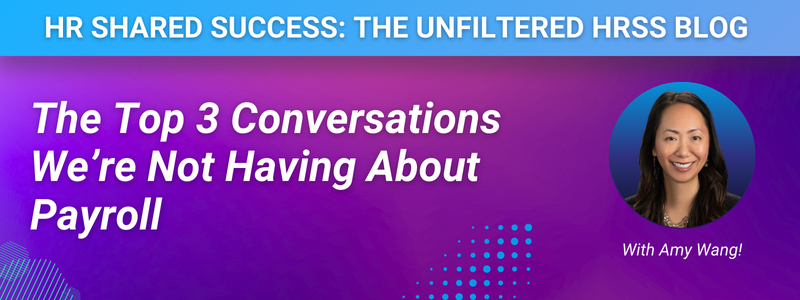Top 3 Conversations We’re Not Having About Payroll

Let’s talk about payroll.
Not the pay cycle. Not the compliance chart. Not the number of tickets closed.
Let’s talk about what payroll actually means to an organization and why it needs to be seen as more than a back-office function. Especially in HR Shared Services, where we’re often juggling systems, people, and pressure all at once.
Here are three conversations I wish more leaders were having.

Payroll professionals are some of the most reliable people in the business, but they rarely get credit.
When pay goes out correctly and on time, no one sends an email. No one high-fives the team. Most employees check their account, nod, and move on with their day.
But if something ever did go wrong? That same payroll team would be the first ones blamed.
In my world, we do more than just process payroll. We own the systems. We manage the integration points. We connect HR, finance, benefits, and compensation in a way that makes sure everything flows. And we do it while staying invisible. That’s intentional. Payroll is designed to work in the background so the business can move forward.
But just because it’s quiet doesn’t mean it’s simple. It’s precise. It’s foundational. And it’s hard.
So, when everything works like it’s supposed to, that silence is not an accident. It’s a signal that your payroll team is doing an exceptional job.

Most employees care that they got paid. But they care even more that they understand it.
One of the most overlooked parts of employee experience is whether your paycheck makes sense. When people do not understand what they are seeing, they start guessing. They wonder if they got shorted. They wonder if something changed. They do not always ask questions directly. But they definitely start talking.
I have seen uncertainty grow when employees do not understand the why behind changes that show up in their pay. It was not because people were underpaid. It was because they were confused. And in the absence of clear communication, the narrative becomes whatever people assume.
Payroll and HRSS can help close that gap.
If you want to build trust, make pay statements simple. Train your managers to explain them. Offer transparent resources. Connect the dots between policy and paycheck. Over communicate changes. Trust is not built in the moment someone gets paid. It is built in whether they understand why they got paid that way.

Too often, payroll is brought in at the end. The new policy is written. The system is selected. The bonus plan is finalized. And then someone remembers to ask, “Can payroll handle this?”
But payroll does not just process transactions. It translates strategy into outcomes.
When we reclassify jobs or restructure teams or launch a new incentive model, it is payroll that turns those ideas into dollars. If payroll is not part of the conversation from the start, we risk introducing gaps that affect compliance, clarity, and employee confidence.
In shared services, the best transformations are cross-functional. That means payroll, HR, HRIS and finance are all at the table together. Not just checking boxes at the end. But shaping decisions that impact how people get paid, when they get paid, and how they experience the company’s commitment to them.

If your payroll team has been invisible, take a closer look. That might mean they are doing everything right.
They are the ones behind the scenes making sure your new hires are paid, your promotions are reflected, your bonus programs are calculated, and your systems are talking to each other.
So, if you are not having problems with payroll, do not assume it is easy. Assume someone worked really hard to make sure it feels that way.
About the Author
Amy Wang shares real-world insights of organizational transformation across HR, IT, finance, and shared services. With experience spanning higher education, healthcare, and automotive industries, she brings a grounded perspective to leading change in complex environments. Amy also serves as a strategic advisor on AI integration, helping organizations align technology with workforce strategy.
She started using #HRRealTalk to open up more honest conversations about leadership, change, and the human side of complex systems. She writes about what actually works, lessons learned, and how to lead with both clarity and empathy.
Connect with Amy on LinkedIn: linkedin.com/in/amywang168
Amy Wang | Voice of Real Talk in HR and Organizational Transformation

